
Scholastic/Kaepernick Publishing
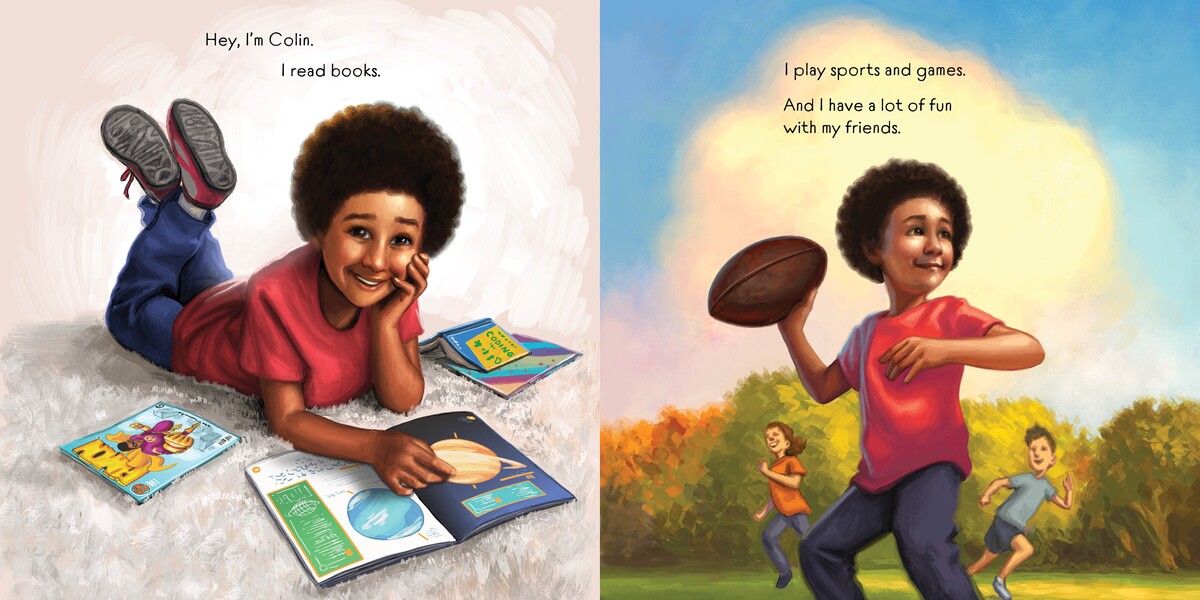
Scholastic/Kaepernick Publishing
When Colin Kaepernick was five years old, his kindergarten teacher gave his class an assignment: Draw a picture of your family.
Kaepernick colored his entire family yellow. When he got to himself, he used the brown crayon.
“What I realized in drawing my family was that in my entire class, I was the only one who didn’t look like the rest of my family,” says Kaepernick, who is Black and adopted into a white family.
That simple-seeming assignment turned out to be a pivotal moment for how Kaepernick viewed his identity. It also became the inspiration, many years later, for his first children’s book, I Color Myself Different.
In the book, a little boy named Colin reads on the floor, throws a football in the park, and in general thinks it’s “supercool” that not many people look like him. “I have supercool skin, supercool hair, and a supercool family,” Kaepernick writes. “Sometimes it’s not easy, but being one of a kind sure is amazing.”
When the kindergarten class gets the assignment, young Colin can’t wait to show off his drawing. Until his classmates ask him:
“Why are you the only brown one in your family?”
“Why did you color yourself different?”
Colin freezes — at first — because he realizes his normal registers as “different” for other people. But then he tells his class:
“I’m brown. I color myself different! I’m me, and I’m magnificent!”
“I love the fact that we have an anthem in there,” says Kaepernick, “or a hook. Because it feels like something that young kids can walk away with and can use.”

Scholastic/Kaepernick Publishing

Scholastic/Kaepernick Publishing
It’s a positive, affirming moment, especially when Colin’s classmates and Black teacher chime in to support him. Kaepernick says it felt like that for him in real life, too.
“It’s the first documented instance that I have in my life of definitively identifying as brown,” says Kaepernick. “And laying the foundation for my identity as Black.”
Colin Kaepernick is most well-known for being a quarterback for the San Francisco 49ers, where he played from 2011 until 2016. He has been the most vocal protester within the NFL when it comes to police brutality and racial inequality in the U.S., and he’s also worked in community organizing. He founded Kaepernick Publishing in 2019, and announced a multi-book publishing deal with Scholastic. I Color Myself Different is the debut children’s book for both Kaepernick and illustrator Eric Wilkerson.

I Color Myself Different
Scholastic/Kaepernick Publishing
hide caption
toggle caption
Scholastic/Kaepernick Publishing
“I saw Eric’s previous work and… there are a few things that immediately jumped out,” says Kaepernick. “One was his ability to pull emotion with his illustrations and really bring that to life… He was able to create just beautiful scenes in their entirety.”
Wilkerson comes from an entertainment background — he’s worked in film, commercials, and video games — and used Adobe Photoshop for these illustrations.
“The first thing I wanted to do is give the characters a stylization that made it look… more like still frames from an animated film,” says Wilkerson. “I wanted it to feel like you turn every page… and it’s like somebody just paused the movie.”
One of Kaepernick’s favorite illustrations is young Colin standing, shoulders back, chin up, chest out, smile on his face. The whole image evokes confidence. Wilkerson explains that’s intentional — it’s called the “low-angle hero pose.”
All the illustrations are bright and colorful, with lots of bold reds and desaturated blues. Wilkerson and Kaepernick collaborated closely on the look of the main character, Colin. Kaepernick sent over some grainy childhood photos. They often worked on the illustrations together, over Zoom, with Wilkerson making adjustments in real time.
“We talked in-depth about the style of the face, the shape of his nose, the ears, the hairstyle, the texture of the hair,” says Wilkerson. He didn’t want the main character to be an exact likeness of Kaepernick, but there is definitely a resemblance.

Scholastic/Kaepernick Publishing
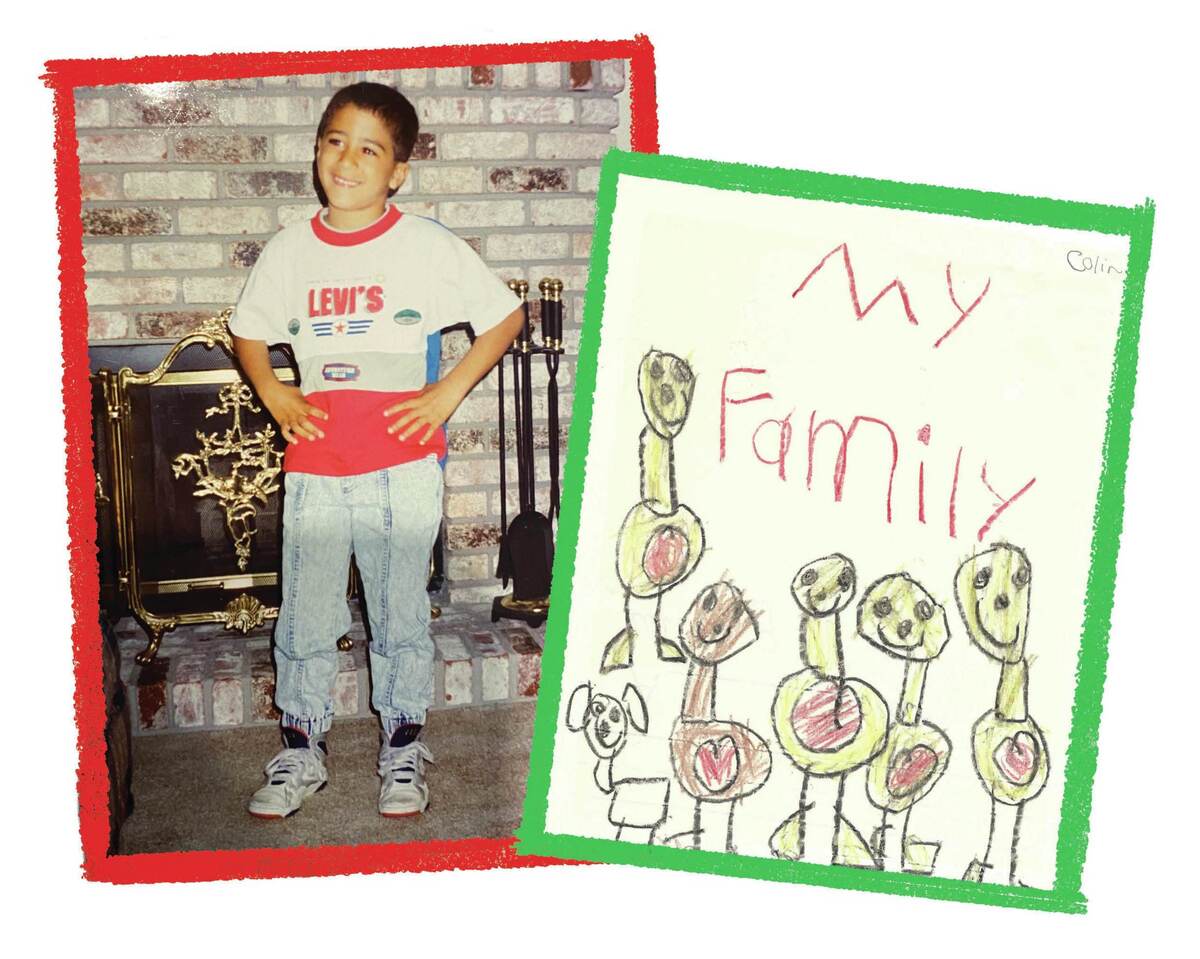
Scholastic/Kaepernick Publishing
For this book, Wilkerson also re-created Kaepernick’s original childhood artwork, which is included in the back of the book.
“He absolutely did me some favors,” Kaepernick says, laughing.
He describes his original drawing this way: “The bodies are round, the necks are pretty long,” he says. “The heads are pretty big and round… thick legs and triangle block feet. I tried to draw hearts in there, but they kind of look like tomatoes, maybe apples. No arms at all.”
The best part of the drawing, Kaepernick says, is the little Lhasa Apso, Kiwi.
Wilkerson gave it a professional upgrade and a personal touch. “I would physically hold a crayon the wrong way and then try to draw with it,” he says. “But also giving myself only 2 minutes to do it.” He asked children of friends and family to draw, and then he scanned their work for the book.
“So even my daughter drew our entire family and it’s on the bulletin board in the classroom in the book,” Wilkerson says. “I was so thrilled that we got to put that in there.” He also used his daughter as a model for young Colin.
“The cover is basically, you know, her outside holding a newspaper,” he says.
Kaepernick’s nieces, Leilani and Knysna Reid, also contributed artwork to I Color Myself Different. “Part of the inspiration for this book was I was reading books to my niece, Knysna,” says Kaepernick. “A lot of the books just didn’t have characters that look like her.”
Leilani and Knysna illustrated the end-pages with a series of hearts, a unicorn, the sun, Kaepernick’s jersey number, and smiling people.
“Thinking about two young Black girls being able to see their artwork in a published book and from a young age be able to say, ‘Oh yeah, I’ve had my artwork published. Now what else can I do?’ You see how it begins to open up possibilities for them just mentally of where they can go and what they can do,” says Kaepernick.
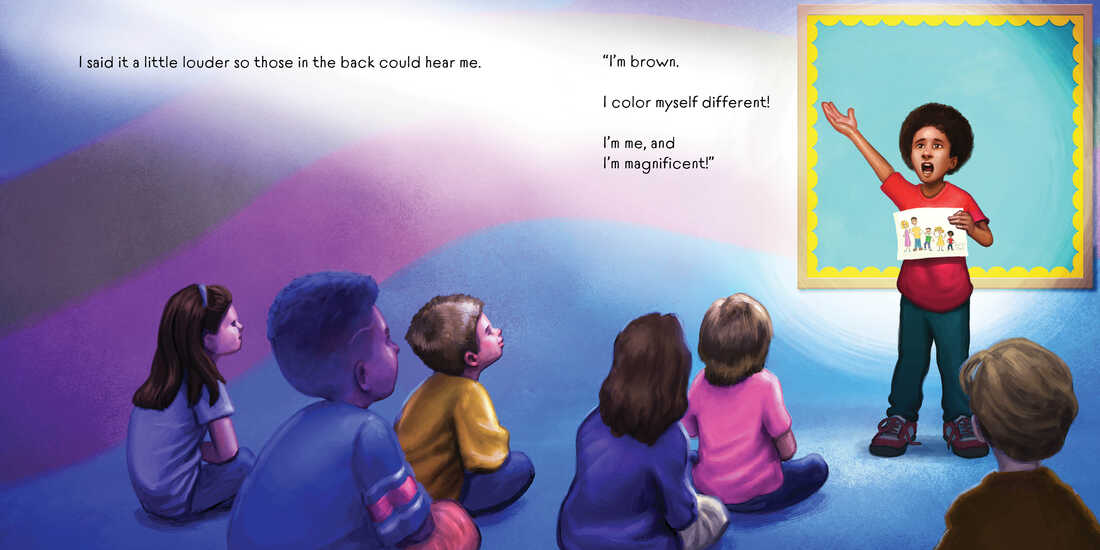
I Color Myself Different, written by Colin Kaepernick and illustrated by Eric Wilkerson
Scholastic/Kaepernick Publishing
hide caption
toggle caption
Scholastic/Kaepernick Publishing
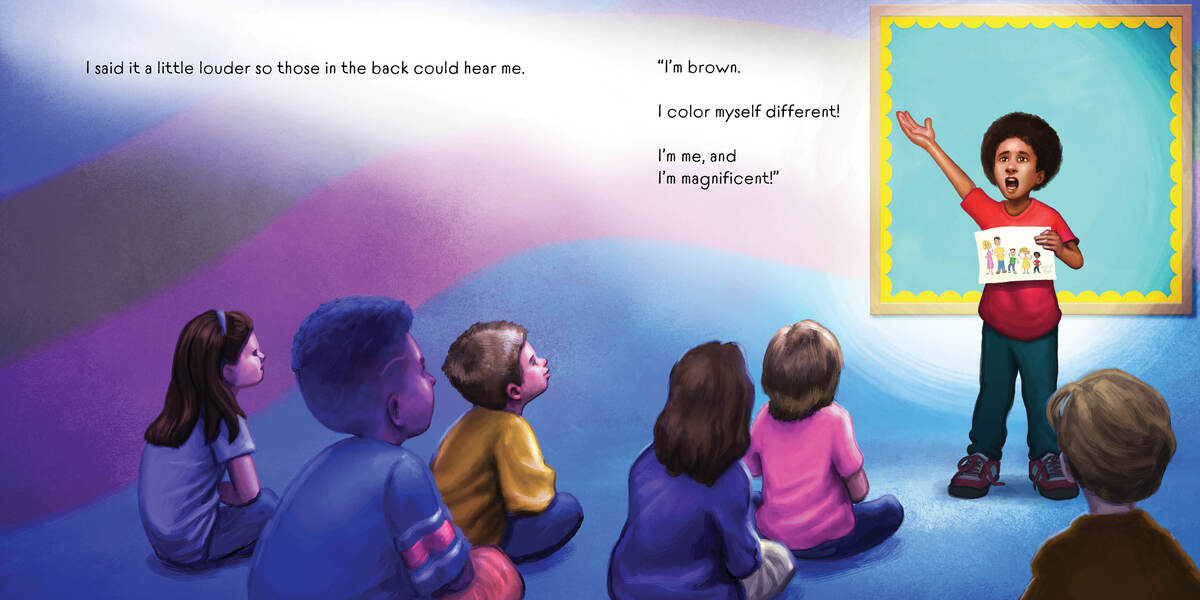
I Color Myself Different, written by Colin Kaepernick and illustrated by Eric Wilkerson
Scholastic/Kaepernick Publishing
Kaepernick says he gave this much consideration to every detail that went into this book. He wanted to make sure his message was clear: being different is “supercool,” but being different is also normal.
“Growing up in a white town and white population or white spaces, you’re constantly the fly in the buttermilk,” he says. “And it was actually one of the things we went back and forth on… how do we address the fact that I’m adopted and different in my family, but also making sure that we’re not positioning Black as different, or brown as different.”
So he made sure that the books young Colin is reading on the first page represent a range of possibilities, with one about space, coding, plus a superhero comic. It was important that Mrs. Musa, the kindergarten teacher, be a Black woman with an African name, and that the best friend who steps in to support Colin is Black.
“They may feel like small pieces, but in the grand scheme of things they add up to be a lot,” Kaepernick says. Ultimately, he and Eric Wilkerson hope that this book helps kids feel less alone.
“The part that I love about being different is you don’t feel like you’re a replica,” says Kaepernick. “I get to be unique. I get to be my full self and… I get to just be free in that sense.”

Scholastic/Kaepernick Publishing
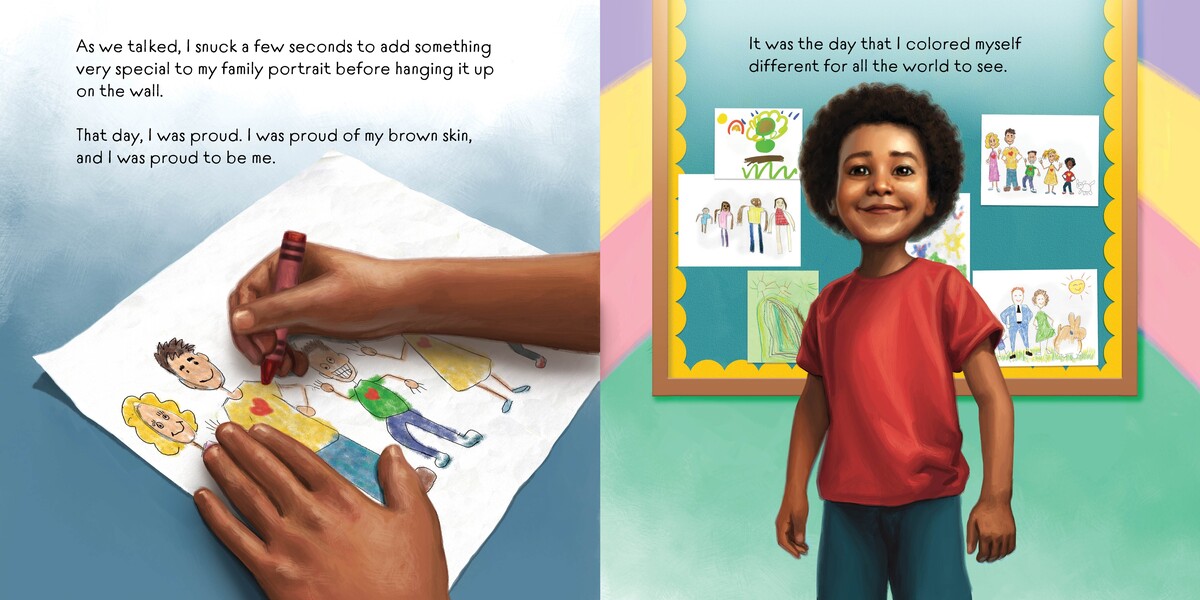
Scholastic/Kaepernick Publishing
Samantha Balaban and Melissa Gray produced and edited this interview for broadcast.
Stay connected with us on social media platform for instant update click here to join our Twitter, & Facebook
We are now on Telegram. Click here to join our channel (@TechiUpdate) and stay updated with the latest Technology headlines.
For all the latest Entertainment News Click Here
For the latest news and updates, follow us on Google News.
